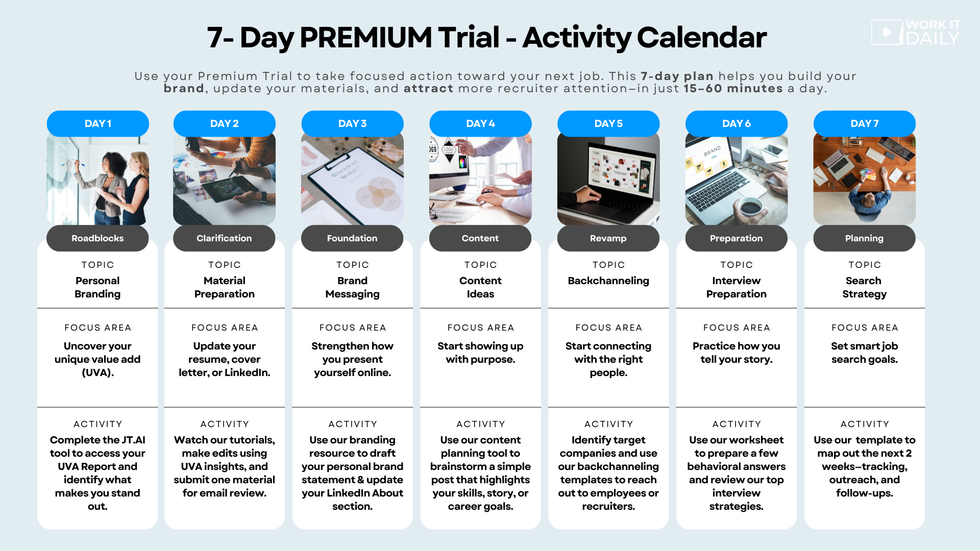Today’s Work It DAILY challenge is simple, but powerful: Shut down negative self-talk.
We all have that inner voice—the one that whispers doubts, exaggerates mistakes, and chips away at our confidence. For many professionals, especially job seekers and those navigating career transitions, this voice can be relentless.
But here’s the truth: If you let your inner critic call the shots, it will hold you back from the success you’re working so hard to achieve.
When something goes wrong—you bomb an interview, make a mistake on a project, or get passed over for a promotion—it’s easy to beat yourself up. You might find yourself thinking things like:
- “I’m terrible at interviews. I’ll never get hired.”
- “I always mess things up.”
- “I’m not cut out for this.”
While it’s important to be responsible for your actions and take accountability for what you can control, there’s a big difference between “I suck at interviews and will never get better!” and “I need to do more interview prep next time."
It’s easy to let that negative emotion consume you. You’re frustrated. You’re emotional. You wanted a different outcome. However, it’s important for both your personal well-being and professional success to practice shutting down this overly critical voice in your head.
These kinds of thoughts might feel honest in the moment, but they’re not helpful. In fact, this kind of negative self-talk will bring down your mood, drain your motivation, and erode your confidence.
When you lack confidence, others can sense it. And if you don’t believe in your potential, why would a hiring manager?
How to Stop Negative Self-Talk
The key is to reframe.
There’s a big difference between “I’ll never be good at this” and “I need to practice this skill more.” One shuts down growth. The other opens the door to improvement.
Let’s say you’re frustrated because your co-worker Bob got the promotion you were hoping for. Instead of thinking:
“I must be terrible at my job. No matter how hard I work, it’s not enough.”
Try reframing it:
“I’m disappointed, but I’ll use this as motivation to grow. What can I improve before the next opportunity?”
It’s okay to feel frustration, disappointment, or even anger, but don’t let those emotions write the story of your career.
The Reframing Challenge
 Bigstock
BigstockEvery time a negative thought about yourself pops into your head today, pause and then reframe it. Turn that critical voice into a coaching voice. Make it actionable. Make it constructive.
Here’s a simple formula to try:
NST Thought: “I failed that interview.”
Reframed Thought: “That interview didn’t go well. What can I learn from it to do better next time?”
Small shifts like this can have a big impact on your mindset, energy, and overall outlook.
Your Turn

Work It DAILY
How do you silence your inner critic? What strategies have helped you reframe negative thoughts? Share your tips on LinkedIn and tag us in the post—we’d love to hear from you!
And if you’re struggling to break the cycle of negative self-talk, you’re not alone. Our coaching team at Work It DAILY can help you develop the tools, habits, and mindset shifts needed to overcome self-doubt and move forward with clarity and confidence.
Sign up for a free trial today and start shutting down those negative thoughts!




